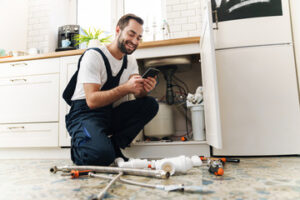Plumbing is a complex and essential aspect of everyday life. With it, daily activities would be easier to complete. Residential plumbers deal with home plumbing issues, including pipes, water systems, and toilets. Plumbers can fix most of the problems that homeowners experience.
 Your home’s plumbing system is a vital part of your daily life. It must run smoothly, from washing dishes at night to getting ready for work in the morning. However, it can also be prone to problems. A plumber’s job is to fix your home’s problems so that you don’t have to worry about them in the future. As a result, it’s important to choose a residential plumber who is transparent about their work and can answer your questions.
Your home’s plumbing system is a vital part of your daily life. It must run smoothly, from washing dishes at night to getting ready for work in the morning. However, it can also be prone to problems. A plumber’s job is to fix your home’s problems so that you don’t have to worry about them in the future. As a result, it’s important to choose a residential plumber who is transparent about their work and can answer your questions.
Unlike residential plumbers, commercial plumbers deal with various systems and properties. They see daily issues and must deal with permits, materials, installation processes, etc. In addition, they should be flexible enough to work around your schedule so that the repairs don’t take longer than necessary.
Drain clearing is a method used to eradicate clogs in the plumbing pipes. This usually involves the use of a motor-powered heavy-duty cable called a plumbing snake, which rotates a blade fastened at its end into the affected pipe to break up blockages. After a clog is broken up, water flow is restored to your home’s plumbing system. However, the clog particles left behind still remain in your piping and may cause issues later on if not addressed properly.
The best way to remove clogs is with professional drain cleaning service. This is a much more effective and long-lasting process than drain clearing. In addition, a drain cleaning process is safer than using caustic chemicals to clear clogs in the sewer. This service is also eco-friendly and can be done on any home drain, no matter its age or condition.
A plumbing leak can be a frustrating problem. It can cause water damage, mold growth and mildew, and it can be expensive to fix. In some cases, leaks can be difficult to find – particularly those that occur in locations that are underground or behind walls. Fortunately, there are some professional leak detection methods that can help you discover the source of your problem before it causes any serious problems.
Leak detection systems can monitor the flow of water and cut it off to any home-using fixtures and appliances if abnormal behavior is detected. This is an excellent way to protect your property from costly water damage and other unforeseen plumbing issues. A leak detector senses varying sound frequencies from different water sources to help a plumber identify where the leak is coming from. It can also be used to detect pinhole leaks, which can be extremely dangerous to a home if not dealt with quickly.
Low water pressure is a common problem that homeowners face. It can be caused by a number of things such as a partially opened shutoff valve, a failing pressure regulator, clogged or corroded pipes, and more. Homeowners should consider the amount of water they use in their homes to determine whether this affects their water pressure. A simple test will help them identify this issue and work with a residential plumber to find the best solution.
The main water supply pipes that travel throughout a city are very large and powerful. Small valves are installed along the lines to control the flow of water. If you suspect that a partially closed valve is causing your low water pressure, inspect all the shutoff valves on the main supply line. Make sure they are completely open to ensure that there is no obstruction.
Plumbers install, repair and maintain water and gas piping systems in homes, buildings and commercial establishments. They also install plumbing fixtures and sewage systems and manage fire sprinklers and drainage systems in the event of an emergency. Typical duties of plumbers include reading and interpreting blueprints to assess or plan plumbing installations and meeting building code requirements for construction projects. They may also coordinate with other construction professionals to ensure the job is completed according to schedule and within budget.
They must be able to solve problems quickly and efficiently and be able to work under pressure. They must also be able to listen well and politely respond to customers. Because many plumbing problems are emergencies that need immediate attention to prevent health and safety hazards, plumbers often work late in the evenings, on weekends, or during holidays. This can be stressful, but it is important to keep an even keel and remain level-headed during emergency situations.
